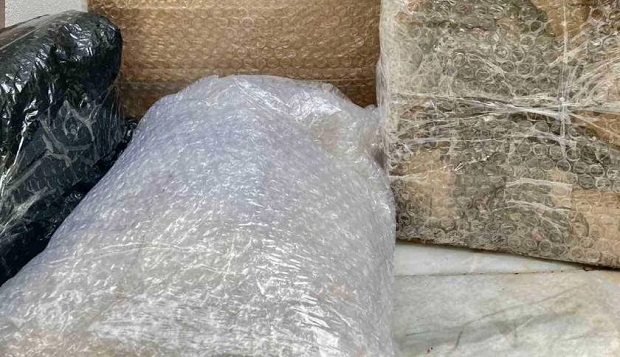The pandemic-driven surge in online merchandise sales is generating a huge volume of new plastic waste every day, mainly from the widespread use of “bubble wraps” to package goods ordered by consumers, Makati City representative Luis Campos Jr. warned over the weekend.

Photo contributed by the Office of Makati City representative Luis Campos Jr.
“If you make an online purchase today, chances are you will receive the item that you ordered in a packet or carton draped in throwaway plastic bubble wrap,” Campos said.
“The problem with these elastic wraps with air-filled cushions is that they cannot be reused. Once they are ripped to open a package, the wraps get trashed and add to all the plastic waste escaping into our water environment,” Campos said.
Laguna Lake, the Pasig River, Manila Bay, and the country’s coastal waters are bound to be swamped with tons of discarded plastic bubble wraps, Campos said.
“Online shopping destinations should ask their logistics partners to reduce their use of bubble wraps, and to consider alternative packaging materials that are either reusable or easier to recycle,” Campos said.
Campos is among the authors of House Bill 9147, which calls for the phaseout of all plastic products designed to be disposed, destroyed, or recycled, after only one use.
The proposed Single-Use Plastic Products Regulation Act is already with the Senate, after the House approved it in July last year. “We are now counting on the Senate to pass the measure without further delay,” Campos said.
Once the bill is enacted, all single-use plastics – from drinking straws and beverage containers to sachets and wraps – shall be phased out within one to four years. Thereafter, the production, importation, sale, distribution, provision or use of single-use plastic products shall be prohibited.
A previous study published in the journal Science Advances showed that major waterways in the Philippines, including the 25-kilometer Pasig River, discharge some 356,000 metric tons of plastic garbage into the world’s oceans every year. Plastic waste, which now accounts for 80 percent of all marine litter, is a persistent pollutant that degrades marine life.
Many marine species die when they ingest, get trapped, or suffocate in plastic scraps, or starve to death when their stomachs become filled with the debris. Over time, ocean plastic fragments, which do not decompose, get weathered and disintegrate into microparticles that cause even greater damage to marine ecosystems.




